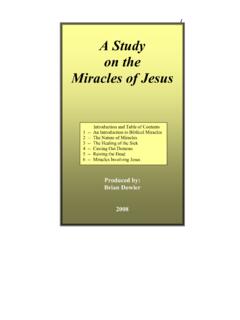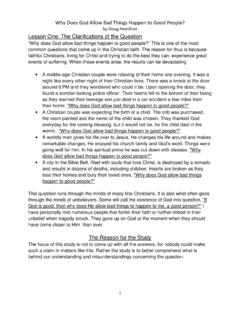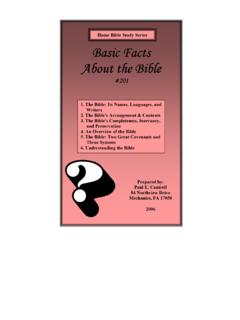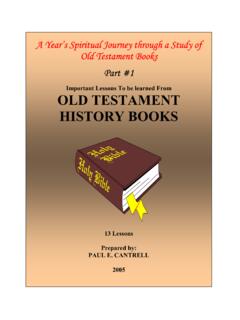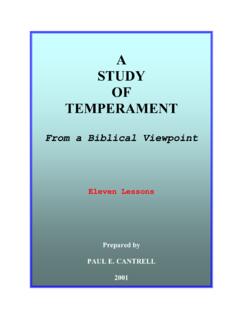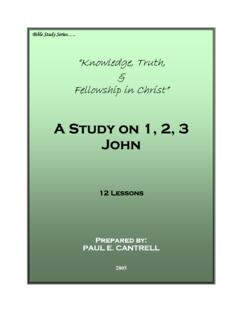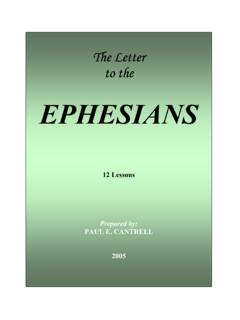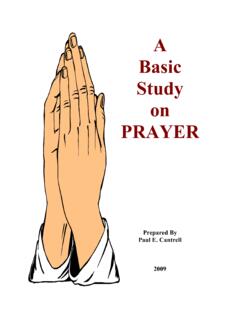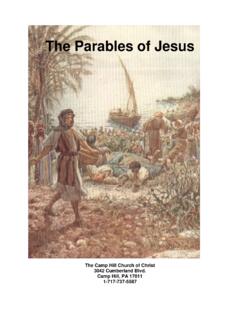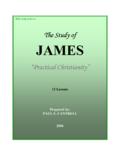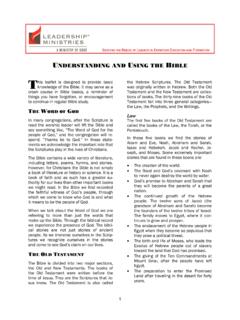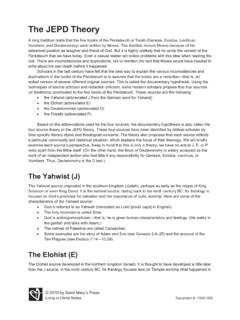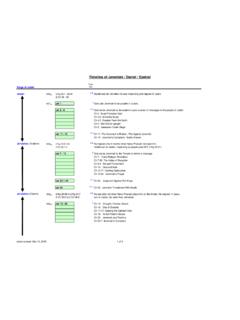Transcription of OLD TESTAMENT MAJOR PROPHET BOOKS - Camp Hill church
1 A Year s Spiritual Journey through a Study ofA Year s Spiritual Journey through a Study ofA Year s Spiritual Journey through a Study ofA Year s Spiritual Journey through a Study of Old TESTAMENT BooksOld TESTAMENT BooksOld TESTAMENT BooksOld TESTAMENT BOOKS Part #3 Part #3 Part #3 Part #3 Important Lessons to be learned from OLD TESTAMENT MAJOR PROPHET BOOKS 13 Lessons 13 Lessons 13 Lessons 13 Lessons Prepared by:Prepared by:Prepared by:Prepared by: PAUL E.
2 CANTRELL 2005 I S A I A H J E R E M I A H L A M E N T A T I O N S E Z E K I E L D A N I E L Important Lessons To be Learned From a Study of OLD TESTAMENT MAJOR PROPHETS BOOKS (Part #3) 13 Lessons Prepared by: PAUL E. CANTRELL 84 Northview Drive Mechanicsburg, PA 17050 2005 Table of Contents Important Lessons from Old TESTAMENT MAJOR PROPHET BOOKS (Part #3) LESSONS TOPICS PAGES 1 -- Introducing the BOOKS of Prophecy 1-3 2 -- Rebellion, Punishment, but Hope (Isaiah 1-12) 4-6 3 -- God s Judgment upon the Nations, but Judah s Deliverance (Isaiah 13-39) 7-9 4 -- The Coming of the Messianic king and Kingdom (Isaiah 40-66)
3 10-12 5 -- Preaching to Closed-Minded People (Jeremiah 1, 36-45, 52) 13-15 6 -- Prophecies to Jerusalem and Judah (Jeremiah 2-35) 16-18 7 -- Prophecies to the Nations (Jeremiah 46-51) 19-20 8 -- Lamenting the Fall of Zion (Lamentations) 21-22 9 -- The Call of a Watchman for Israel (Ezekiel 1-3) 23-25 10-- Jerusalem s Destruction Vividly Described (Ezekiel 4-24) 26-28 11-- Judgment upon the Nations, but Restoration for Judah (Ezekiel 25-48) 29-31 12 Faithfulness in Adversity (Daniel 1-6) 32-34 13-- All Kingdoms Come and Go Except One (Daniel 7-12) 35-36 Lessons from OT BOOKS of Prophecy Page 1 Lesson One Introducing the BOOKS of Prophecy One of the richest sources of study and inspiration in the Old TESTAMENT is the BOOKS of Prophecy.
4 They provide a rich source of learning about mankind: their tendencies, their aspirations; their needs, and their problems. We learn much about God as well: His great attributes and His ways and means of working among men. As well, we can learn about faithful, godly leaders among God s people that affected their lives. These Prophets were some of the most spiritual and courageous men of the Old TESTAMENT . God used them greatly. Truly the BOOKS of Prophecy live up to the Apostle Paul s statement in Romans 15:4: For whatsoever things were written aforetime were written for our learning, that we through patience and comfort of the Scriptures might have hope.
5 As Christians, we miss much of our birthright when we fail to read and study these BOOKS of Prophecy! The Prophets had a message for the people of their day and their hearts yearned to deliver it. Some of the greatest recorded sermons can be found in these BOOKS . Their messages were filled with: 1. Denunciation of sin; 2. Glories of being a Child of God; 3. Great Promises of God to watch over His Children; 4. The great Plan of God for the future! 5. Calling God s People back to the to faithfulness as a People of God!
6 WHO WERE THE PROPHETS? The word PROPHET is used for translating three different Hebrew words. Some translation may not use the word PROPHET , but possibly a synonym that has a close connection with the same concept. 1. Ro eh (Occurs 11 times can be translated Seer ) One who sees a man of vision. 2. Chozeh (Occurs 22 times similar idea) He has knowledge others do not.. 3. Nabhi (Occurs over 300 times) One who announces spokesman for another. The general idea is of one who has received a vital message from God that must be spoken.
7 God has called, endowed, and commissioned him to go speak. It must be understood that: 1. The Message he speaks is not his, but God s. 2. The words are not his, but God s Words. 3. He is as one who speaks in the place of God! 4. He is like an Ambassador to God s people (Amos 3:7-8; Jeremiah 23:16; Ezekiel 13:1-7). Quite often the phrase will appear: Thus sayeth the Lord. They were given a message to be spoken (Jeremiah 20:9; Isaiah 6:8). Other terms are also used to identify these men, such as: Man of God (1 Samuel 9:6; 1 Kings 17:18), Servant of God (1 Chronicles 6:49; 1 Kings 18:36), Messenger of Jehovah (Isaiah 42:19), and Watchman (Ezekiel 3:17; 33:7).
8 Also, there were many more prophets that Lessons from OT BOOKS of Prophecy Page 2 are mentioned, but have not left writings of their work. Two of the better known ones are Elijah and Elisha. Nathan and Gad were also prominent in the lives of God s People. It is possible that these and/or other Prophets may have been used by God to record much of the information in the BOOKS of History (2 Samuel 12:1; 24:11; 1 Kings 1:11). CHARACTERISTICS OF THESE MEN 1. In each case they were called by God personally (Isaiah 6:8). 2.
9 They were conscious of God s authority being behind their message. Thus sayeth the Lord is used often. They were speaking the words of God. (2 Peter 1:21) 3. They spoke courageously and uncompromisingly. They were not bound by public opinion (Jeremiah 38:1-6; Amos 7:10). They would not be stopped by Kings, False Prophets, nor persecution. 4. They were men of clean and consecrated lives and character. Their moral lives went unchallenged. Their lives were beyond reproach which caused no hindrance to their message.
10 5. They were men of spiritual depth and communion with God. 6. They faithfully and fiercely denounced all evil practices. They were Preachers of Righteousness. They were moral reformers and ethical teachers. They were disturbers of men s minds, as well as their indifferences. They had no respect of persons in their messages. 7. They were also revealers of future events in history. They revealed the Divine purposes of God. They gave great insight to the coming Messiah and the Messianic Age.
